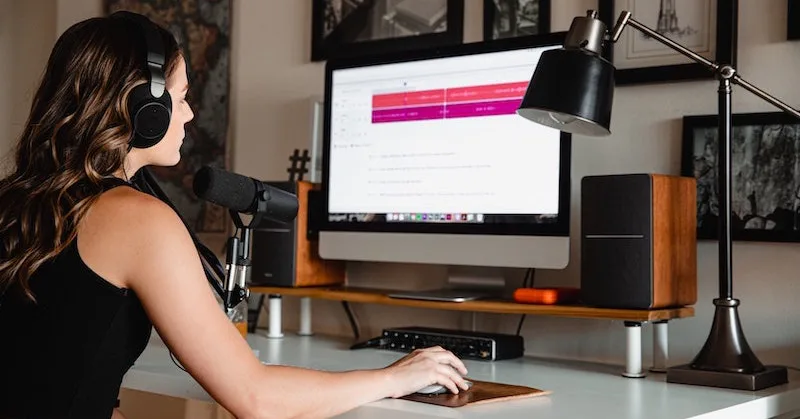How to Become a Transcriber

There are many perks to becoming a transcriber and it’s a good feeling to know you’re making content more accessible!

There are many perks to becoming a transcriber. When you become a transcriber you are making a big difference in the lives of hard of hearing people and you will enjoy the satisfaction of a job well done. You also have the flexibility to become a transcriber at home. However, it is not as simple as you might think. Find out the qualities of a good transcriber, the equipment you need and how to get started here.
How to Become a Transcriber At Home
Many people are now working from home, some because a large number of workplaces have transitioned to a work-from-home workflow, and some because it feeds into a particular lifestyle they’d prefer to have. Working from home, for many, is ideal and very convenient.
Sometimes, people quit their office jobs intentionally so they can transition into a work-from-home scenario. And often people need to find a supplementary source of income, or would like to change careers, and they’d prefer to work home -- begging the question, what type of work can you do from home? Transcriber at home is one such job.
Transcription has become a desirable industry because it’s the type of work that can be done from anywhere. And not only is it desirable for those who are working in, or who want to work in, the field, but a large number of businesses rely on transcribers.
Who Needs Transcribers?
On the business end of things, there are countless businesses, industries, academic establishments, and other entities who are aware of the importance of making their content accessible. Accessibility is the latest buzzword and as we become an inclusive-centric society, it means making sure those with certain limitations aren’t missing out on the message.
There is no lack of content out in the world. The internet is brimming with informative videos, influencers posting Instagram stories, Tik Tok dancing clips, and viral YouTube content, and all of that content is much better off being presented with captions, for maximum accessibility, and to get those captions, a transcriber is necessary.
How Do I Find Transcription Work and Become a Transcriber?
With all this content and the desire to make it accessible, it’s no surprise that transcribers are in high demand, and that many people are considering getting into this line of work. Transcription can be done from home, and many companies are interested in hiring a transcriber, and many other companies are in the business of providing a steady stream of transcribers to clients. So, if you’re interested in doing transcription work, how do you become a transcriber?
If you’re going to be a freelance transcriber, you’ll have to find clients to transcribe for. The internet makes this relatively simple, in that, there are plenty of gig websites where freelancers can advertise that they are looking for work, and businesses can advertise their needs. It’s advisable to not just rely on one gig website, but instead, to familiarize yourself with several, or many, and sign up and check them daily for gigs that you can bid on. Or, work for a transcription company.
Reputable transcription businesses typically pay per audio hour, and rates vary, but remember, the faster you are at transcribing, the better you’ll be paid. Once you’ve got a transcription job to do, it’s time to get to work!
Transcription Is Not as Simple as It Seems
Transcribing audio -- how hard can it be? One would assume that you simply take what you hear and type the words, and it’s that simple. The truth, however, is that it’s more complicated than that, and becoming a professional transcriber does require time, patience, and the mastery of a very specific skill set, which we’ll discuss shortly, but it’s important, first and foremost, not to assume it’s an easy job.
A freelance transcriber who was interviewed for an article on worldoffreelancers.com, had this to say about transcription work: “It’s a lot more difficult than people imagine. Proper punctuation seems to be the biggest hurdle, but once you get it, you’re good. A few, but not many, have found that they just don’t enjoy it. They’re definitely in the minority, but there are some who’ve decided they’d rather stick with a regular job.”
So let’s say you’ve decided this is something you’d definitely like to become a transcriber, but you have no previous experience. What does it take to become someone who can transcribe audio, and do it well?
What Qualities Does It Take To Become a Good Transcriber?
A good transcriber needs to have a very strong and capable grasp of the language they are transcribing in. Let’s say that our hypothetical transcriber-to-be speaks English and wants transcription work in English. Their grammar, punctuation, and vocabulary all have to be top-notch.
It’s most desirable to not only be a native speaker of the language one is working with, but also possess a mastery of that language. Otherwise, some audio might not get transcribed as it should. Someone who very seriously wants to learn how to become a transcriber will either want to brush up on their knowledge of grammar, or even take an English class, depending on their level.
Clients expect the final product to be of the highest quality in terms of the previously mentioned points. Keyboard dexterity and superior listening skills are also on the list of valuable transcriber qualities. The faster and more accurately the transcriber can type, the quicker the transcription will be completed, which means a happy customer, and for the transcriber, it can mean higher income.
Do You Need to Take a Course to Become a Transcriber?
While there are plenty of transcription courses available on the internet, some out there might just be looking to make a quick buck off of those who are looking for easy ways to become a transcriber at home. It’s important to do your due diligence if you plan on taking a course. Make sure you are dealing with a reputable instructor and program.
If our future transcriber is not much of a typist, then a typing course may be a good place to start. A typing speed of at least 60 words per minute is of great benefit to a transcriber. Why? The faster you are accurately typing, the more money you will make. You’ll produce more transcripts and the more you produce, the more you’ll get paid. So, while a course is not necessary, a certain skill set is, and it depends on what you possess and what you don’t -- and what you need to improve.
Oh, and one more thing -- familiarize yourself with a captioning style guide, or several. Most companies that hire transcribers will provide them with a style guide, but a solid understanding of what a style guide is and why they are used is just another part of being a good transcriber.
Does a Transcriber Need Equipment?
As previously mentioned, in almost all cases, the work can and will be done from the transcriber’s home -- therefore, a quiet, functional home office is the ideal setting for the transcription process. Not only does a transcriber at home need a quiet place to work, away from distractions, but a transcriber also needs to be properly set up with the right equipment.
A comfortable chair, a desk, and of course, access to the internet, are all essential. A computer or laptop, along with good quality, over-the-ear headphones are also essential, and, while this piece of equipment is optional, a foot pedal can elevate a transcriber’s ability to get the job done more quickly.
The foot pedal can be plugged into the computer and can allow the transcriber to pause, forward, or rewind the audio using a tap of the foot, which frees up the hands to do the typing. The keyboard is also not to be overlooked. Serious, experienced transcribers often acquire an ergonomic keyboard. All that typing can be strenuous on the hand and wrist joints, and an ergonomic keyboard can be helpful in alleviating some of those strains.
By the way, using a mobile phone (or tablet) is not recommended. Proper, quick transcription is best performed using a high-quality keyboard. Plus, transcription software is typically not compatible with those types of devices.
Transcription software is the final, essential component in a transcriber’s toolbox and is crucial to the end product. There are many transcription softwares available, and it will be up to the transcriber to decide on which one will be used. A number of new softwares eliminate the need to type. These are equipped with re-speaking technology or use an artificial intelligence component in which the software can detect the audio and the transcriber then would edit the file for accuracy.
Should I Become a Transcriber at Home?
While not necessarily easy work, many transcribers find the flexibility of working hours to be beneficial, as often, once a job comes their way, while there will be a deadline, they can set up the day on their own terms and find the right time to do the job. And if it doesn’t fit into their schedule, as a freelancer, one can choose to turn down the job and decide on the next one.
Transcribers also typically enjoy the feeling of satisfaction they get after a job is complete, with a real sense of accomplishment that something tangible and worthwhile has been done. Remember, as a transcriber, you’re making content highly accessible to many types of disadvantaged persons. Deaf, deafened and the hard of hearing, not to mention those learning a second language, as well that those on the neuro-diverse spectrum, all rely on closed captions when consuming content.
It’s a good feeling to know you’re making content more accessible, and if that sounds interesting, then maybe transcription work is right up your alley!
Are You Interested in Becoming a Transcriber?
Last updated: August 05, 2021
We want to hear from you.
Request a quote, or just let us know how we can make your media accessible.
